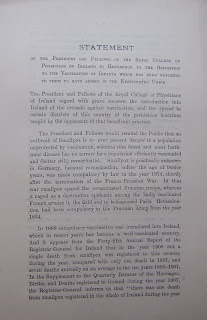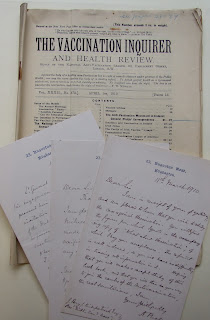The College of Physicians and the Anti-Vaccination League.
This week RCPI has been supporting European Immunization week, a European wide programme to promote the core message that immunization of every child is vital to prevent diseases and protect life. Just over one hundred years ago RCPI was involved in another campaign to promote vaccination in Ireland, and one which brought them into conflict with the Anti-vaccination League.
On 4 February 1910 RCPI published a statement 'in reference to the opposition to the vaccination of infants which has been reported to them to have arisen in the Enniscorthy Union'. The statement expresses
'grave concern [over] the introduction into Ireland of the crusade against vaccination, and the spread in certain districts of this country of the pernicious doctrines taught by the opponents of that beneficent practice'.

The pamphlet goes on to state the history and development of vaccination, and give a range of statistics to support the need for vaccination. The returns of the Registrar-General for Ireland in 1908 show that there was not a single death in the country from smallpox that year, and that the number of deaths have been falling since 1868 when compulsory vaccination was introduced. This is in comparison to 96,281 deaths from smallpox in the twenty years from 1831 to 1851, an average of 4,814 deaths per annum. As well as addressing the success of compulsory vaccination, the pamphlet also touches on the purity of the vaccine lymph used for the public vaccinations in Ireland, and attests to its quality and safety.
'With all the evidence before them, and having regard to the strict precautions which are taken at the present day to secure that only the purest vaccine lymph shall be used, the President and Fellows would urge the people of Ireland to cling to their faith in a preventative measure which has rid their native land from one of the most terrible plagues which has ever afflicted the human race'.
RCPI may have felt they had made a strong case in favour of vaccination, but the Anti-Vaccination League had other ideas, and were to engage the College and the Dublin Sanitary Association in a lengthy debate on the subject. The Anti-Vaccination League had been founded in 1896 to campaign, as the name suggests, against compulsory vaccination. By 1910 the President of the League was a General Arthur Phelps (1837-1920), an ex-Indian officer who since his retirement had developed an interest in homeopathy and anti-vaccination. The April and June 1910 edition of The Vaccination Inquirer and Health Review, the league's publication, both contain lengthy pieces on 'the anti-vaccination movement in Ireland', including a correspondence between Phelps and T P C Kirkpatrick, who was both Registrar of the College and President of the Dublin Sanitary Association.

Kirkpatrick's archive which contains a file of material on this subject, includes three personal letters from Phelps, sending Kirkpatrick anti-vaccination publications, asserting the accuracy of the facts they contain, and finally declining an invitation to hear Dr Kirkpatrick present his paper on 'The history of the prevention of smallpox'.
The question of the purity of the calf-lymph used in vaccinations, and the attributing of deaths directly to 'cowpox and other effects of vaccination' was a key issue for anti-vaccination campaigners. The Irish Anti-Vaccination League, founded in 1905, produced this postcard in 1912, with a graphic example of the 'dangers' of vaccination. The accompanying text states that 1,338 deaths have resulted from vaccinations between 1875 and 1909, and in the last year two cases of 'that awful disease of erythema circinatum' have resulted.